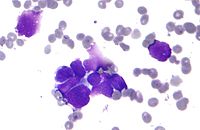
Locoregional recurrence after nephrectomy for localized renal cell carcinoma: Feasibility and outcomes of different treatment modalities
Sign Up to like & getrecommendations! Published in 2022 at "Cancer Medicine"
DOI: 10.1002/cam4.4790
Abstract: Locoregional recurrence after nephrectomy for localized renal cell carcinoma (RCC) is rare with diverse manifestations. The selection criteria and efficacy of different treatments are unanswered. The objective was to compare different treatment modalities and present… read more here.
Keywords: localized renal; cell carcinoma; renal cell; recurrence nephrectomy ... See more keywords

Molecular risk factors for locoregional recurrence in resected non-small cell lung cancer.
Sign Up to like & getrecommendations! Published in 2023 at "Cancer medicine"
DOI: 10.1002/cam4.6165
Abstract: BACKGROUND Locoregional recurrence is of high risk and is associated with a poor prognosis in terms of OS for non-small cell lung cancer (NSCLC). Local control is essential for radical cure of NSCLC. Previous studies… read more here.
Keywords: non small; locoregional recurrence; risk factors; recurrence ... See more keywords

A multi-objective radiomics model for the prediction of locoregional recurrence in head and neck squamous cell cancers.
Sign Up to like & getrecommendations! Published in 2020 at "Medical physics"
DOI: 10.1002/mp.14388
Abstract: PURPOSE Locoregional recurrence (LRR) is the predominant pattern of relapse after non-surgical treatment of Head and Neck Squamous Cell Cancers (HNSCC). Therefore, accurately identifying patients with HNSCC who are at high risk for LRR is… read more here.
Keywords: neck squamous; treatment; multi objective; locoregional recurrence ... See more keywords

Correlation between the duration of locoregional control and survival in T1–T2 oropharyngeal cancer patients
Sign Up to like & getrecommendations! Published in 2019 at "European Archives of Oto-Rhino-Laryngology"
DOI: 10.1007/s00405-019-05293-z
Abstract: PurposeTo investigate the correlation between the time to locoregional recurrence and survival in T1–T2 oropharyngeal squamous-cell carcinoma (OPSCC) patients.MethodsA retrospective, single-site study of patients with T1–T2 OPSCC treated with curative intent between 2000 and 2015… read more here.
Keywords: recurrence; control; locoregional recurrence; time locoregional ... See more keywords

A need for biology-driven personalized radiotherapy in breast cancer
Sign Up to like & getrecommendations! Published in 2017 at "Breast Cancer Research and Treatment"
DOI: 10.1007/s10549-017-4522-z
Abstract: been introduced in radiation oncology reflections but needs validation in prospective clinical trials. In the pre-trastuzumab era, the role of RT in reducing locoregional recurrence in patients with tumours of all BC subtypes apart from… read more here.
Keywords: recurrence; locoregional recurrence; breast cancer; biology ... See more keywords

Factors predictive of locoregional recurrence following neoadjuvant chemotherapy in patients with large operable or locally advanced breast cancer: An analysis of the EORTC 10994/BIG 1-00 study.
Sign Up to like & getrecommendations! Published in 2017 at "European journal of cancer"
DOI: 10.1016/j.ejca.2017.04.012
Abstract: PURPOSE Identification of clinicopathological factors predicting for a locoregional recurrence (LRR) after neoadjuvant chemotherapy (NAC) could help to decide on the optimal locoregional radiotherapy. The objective of this trial is to identify those factors in… read more here.
Keywords: analysis; locoregional recurrence; breast cancer; neoadjuvant chemotherapy ... See more keywords

Propensity score adjusted analysis of patients with isolated locoregional recurrence versus de novo locally advanced NSCLC treated with definitive therapy.
Sign Up to like & getrecommendations! Published in 2020 at "Lung cancer"
DOI: 10.1016/j.lungcan.2020.04.035
Abstract: OBJECTIVES Definitive intent treatment of isolated locoregional recurrence (iLR) for non-small cell lung cancer (NSCLC) is becoming more common. This study explores outcomes associated with the definitive local treatment of iLR and compares these outcomes… read more here.
Keywords: nsclc; locoregional recurrence; therapy; nsclc treated ... See more keywords

Predictors of locoregional recurrence in early stage buccal cancer with pathologically clear surgical margins and negative neck.
Sign Up to like & getrecommendations! Published in 2018 at "Acta otorrinolaringologica espanola"
DOI: 10.1016/j.otorri.2017.09.003
Abstract: OBJECTIVE To identify the significant predictors of locoregional recurrence in early stage squamous cell carcinoma (SCC) of buccal mucosa with pathologically clear surgical margins and negative neck. METHOD Seventy-three patients who underwent per oral wide… read more here.
Keywords: surgical margins; recurrence; locoregional recurrence; early stage ... See more keywords

Hemoglobin A1c level is a prognostic factor for locoregional recurrence in stage III non-small cell lung cancer patients treated with radiotherapy.
Sign Up to like & getrecommendations! Published in 2021 at "Thoracic cancer"
DOI: 10.1111/1759-7714.14174
Abstract: BACKGROUND The level of hemoglobin A1c (HbA1c) might be associated with the severity of tumor hypoxia in patients with cancer. Here, we evaluated the association between the level of HbA1c and survival outcome in stage… read more here.
Keywords: locoregional recurrence; level; hba1c; lung cancer ... See more keywords

Chronic hyperglycemia is an adverse prognostic factor for locoregional recurrence‐free survival in small cell lung cancer patients treated with radical radiotherapy
Sign Up to like & getrecommendations! Published in 2022 at "Thoracic Cancer"
DOI: 10.1111/1759-7714.14601
Abstract: Plasma glucose levels might be associated with the severity of tumor hypoxia in patients with cancer. In our previous study, we found that chronic hyperglycemia significantly increased the risk of locoregional recurrence in patients with… read more here.
Keywords: lung cancer; locoregional recurrence; small cell; treated radical ... See more keywords

PCR‐based quantitative detection of intraperitoneal free cancer cells for predicting locoregional recurrence after rectal cancer resection
Sign Up to like & getrecommendations! Published in 2022 at "ANZ Journal of Surgery"
DOI: 10.1111/ans.17436
Abstract: Locoregional recurrence after curative resection remains an important issue in the treatment of colorectal cancer (CRC). The aim of the present study was to investigate the clinical significance of quantitative detection of intraperitoneal free cancer… read more here.
Keywords: locoregional recurrence; quantitative detection; resection; detection intraperitoneal ... See more keywords